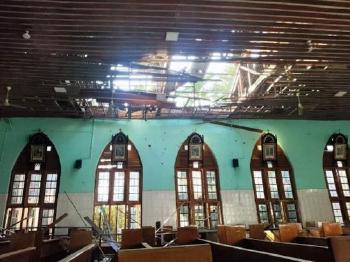The entire population of Taal village in Chin state was forced to flee after soldiers ransacked homes, killed animals and destroyed valuables during a series of raids in the largely Christian region.
During these raids the Tatmadaw (Myanmar military) soldiers occupied a church in Taal, near the town of Falam, throwing away Bibles and hymn books as well as leaving the building full of garbage.
In Chat village, near the town of Mindat, the soldiers attacked two churches, destroying Bibles and damaging equipment including an energy generator.

Clothes and books scattered after the Tatmadaw raid on the village of Taal [Image credit: The Chin Journal]
On July 20 about 90 soldiers entered Taal, stealing or destroying valuables in 21 of the village’s 36 houses. The soldiers also threw residents’ possessions, including Christian books, out of windows and onto floors.
Taal’s population of around 160 people fled into the surrounding forests and hills, returning later once the troops had left.
In a second raid, which began on August 9, about 150 troops ransacked the remaining houses in Taal, beating two men ages 43 and 22, destroying more property and killing livestock.
A local church leader said that when the soldiers came, “all the villagers fled into the mountains and forests. [The soldiers] entered the village, ransacked the houses, and killed all the poultry and pigs.” Taal’s residents have since remained in hiding, with many sheltering in the town of Falam.
Villagers lost 380 chickens and eight pigs, as well as furniture, household appliances and blankets, with total losses valued at almost 30 million kyat ($18,000).
These figures came from the Institute of Chin Affairs, an India-based group of ethnic Chin people, which has called for an end to the Tatmadaw's acts against international humanitarian and human rights law. At least 108 ethnic Chin people have been killed by the Tatmadaw since the February coup, according to the Institute, rising from an estimated 81 in August.
The Chin population of Myanmar is thought to be at least 90% Christian. The Tatmadaw has for many years persecuted the Christian-majority Chin, Kachin and Karen ethnic groups, as well as the Muslim-majority Rohingya.

